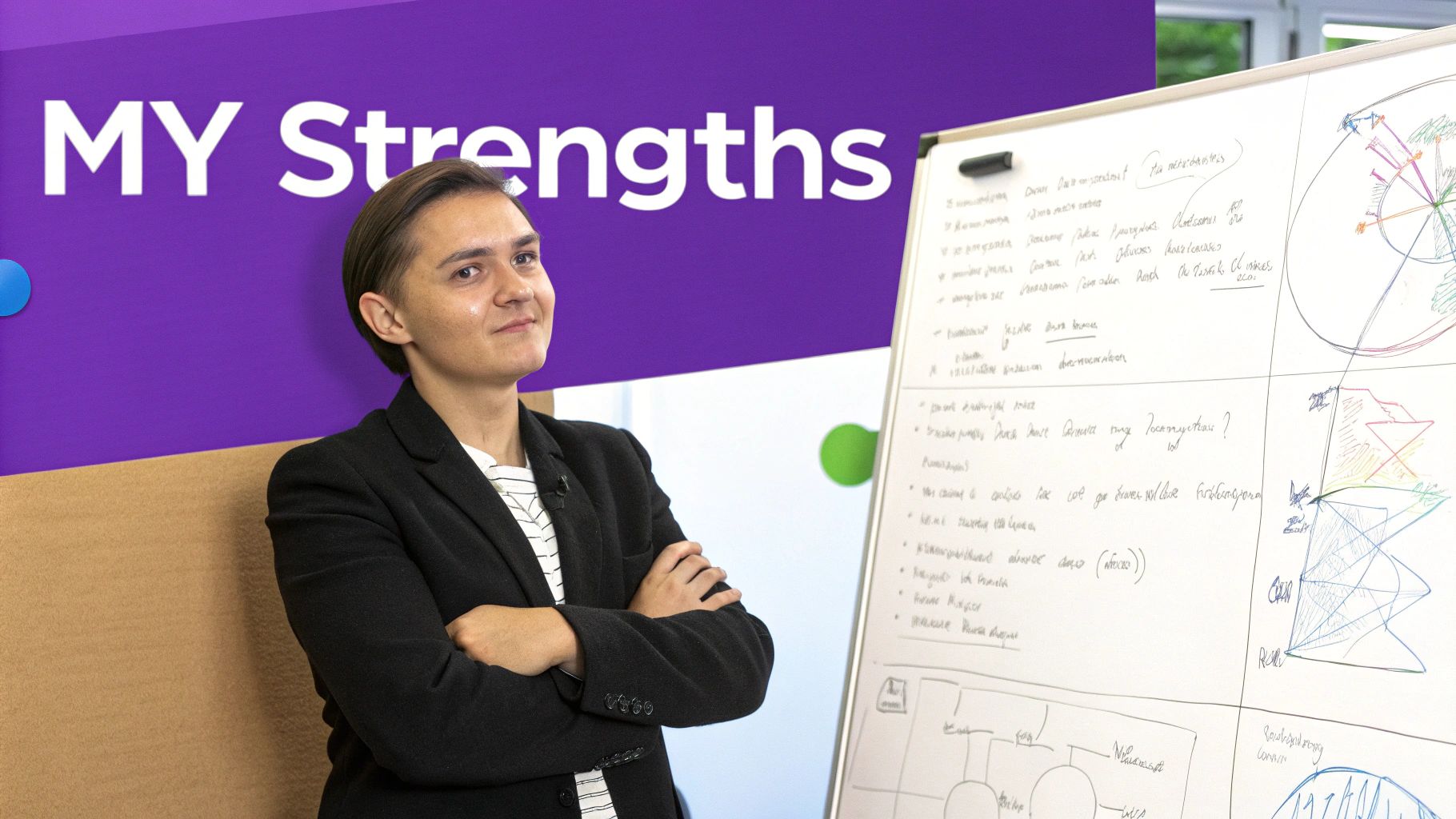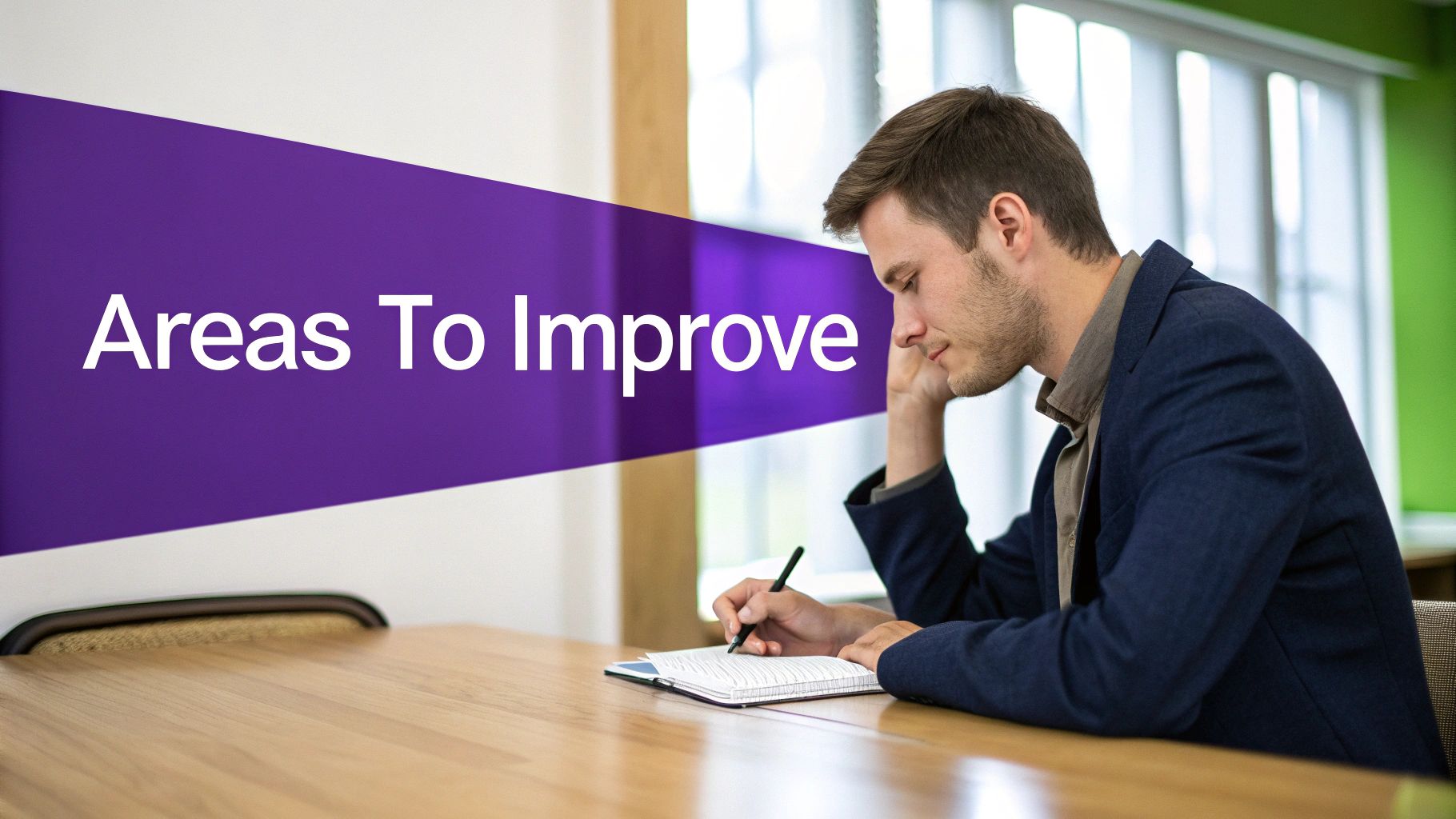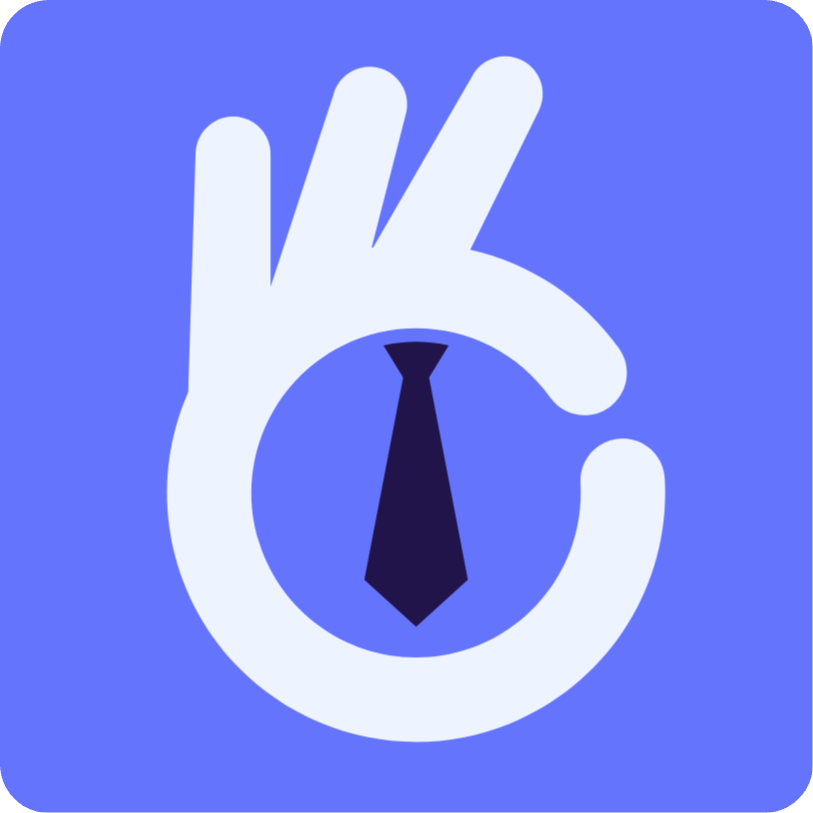7 Common Entry Level Job Interview Questions in 2025
Stepping into your first professional interview can feel like navigating a maze. The good news? Most entry-level interviews revolve around a core set of questions designed to understand who you are, what you can do, and how you will fit into the company culture. This guide is your roadmap. It's not just a list; it’s a strategic breakdown of the most common entry level job interview questions you are almost guaranteed to face.
We will dissect what employers are really asking with each question, providing structured, actionable advice for crafting memorable and effective answers. For each of the core questions covered, you will find a clear framework, sample responses, and professional tips to help you stand out from other candidates. Beyond just knowing what to say, it's crucial to understand the underlying principles of how to answer interview questions confidently to make a lasting impression.
Our goal is to give you a significant advantage. By understanding the intent behind these questions and preparing thoughtful responses, you can transform a nerve-wracking experience into a career-launching conversation. Let’s move beyond memorized scripts and build the confidence you need to get hired.
1. Tell me about yourself
This seemingly simple request is often the very first thing an interviewer asks, making it one of the most crucial entry level job interview questions you'll face. It's not an invitation to share your life story; it's a strategic opportunity to deliver a concise, compelling "elevator pitch" that frames you as the ideal candidate from the outset. A strong answer sets a positive tone for the entire conversation.

The key is to connect your past experiences and future goals directly to the needs of the company and the specific role you’re applying for. Before you can effectively articulate your story, you need to understand it yourself. This is where improving self-awareness becomes a critical first step in your preparation.
How to Structure Your Answer
A widely recommended and effective method is the Present-Past-Future formula. This structure helps keep your answer focused, relevant, and brief, ideally lasting between 60 and 90 seconds.
- Present: Start with your current situation. For an entry-level candidate, this might be your recent graduation, a key project you just completed, or an internship you're wrapping up. Mention your most relevant skills and what you're passionate about professionally.
- Past: Briefly connect your present to your past. Mention specific experiences, such as coursework, previous internships, or volunteer work, that have prepared you for this role. Highlight 1-2 key accomplishments that demonstrate the skills the employer is seeking.
- Future: Conclude by explaining why you are excited about this specific opportunity. Connect your skills and goals to the company's mission and the job description, showing the interviewer why you are a perfect fit and what you hope to achieve with them.
For a deeper dive into crafting the perfect response, you can explore this helpful video guide.
By practicing this structured approach, you can deliver a confident and memorable introduction that immediately captures the interviewer's interest. To get personalized help, you can use a job application answer generator to craft and refine your response.
2. Why do you want to work here?
This is one of the most common entry level job interview questions, designed to gauge your genuine interest and motivation. Interviewers ask this to see if you’ve done your homework beyond a quick glance at the company's homepage. A well-researched, thoughtful answer demonstrates that you are not just looking for any job, but that you are specifically invested in this company and what it represents.

Your goal is to prove you are a deliberate and enthusiastic candidate who aligns with the company's culture, mission, and goals. It’s your chance to flatter the employer genuinely by showing you understand what makes them unique. A generic answer about a "great reputation" or "good benefits" will fall flat; specificity is crucial to making a strong impression.
How to Structure Your Answer
A compelling response should seamlessly blend your admiration for the company with your own career aspirations. Structure your answer by focusing on three key areas: the company, the role, and your personal connection.
- The Company: Start by highlighting specific aspects of the company that excite you. This could be their innovative products, their commitment to sustainability, their unique company culture, or a recent achievement you read about in the news. Mentioning something specific shows you’ve put in the effort. For example, "I was particularly impressed by your recent 'GreenTech Initiative' mentioned in Forbes, as environmental responsibility is a value I hold strongly."
- The Role: Connect your interest in the company to the specific position you are applying for. Explain how this role is a perfect next step for you and how it will allow you to contribute to the company's success. For instance, "This marketing coordinator role seems like the ideal opportunity to apply my social media strategy skills, which I developed during my internship, to help grow the audience for the innovative products you're launching."
- Your Personal Connection: Conclude by summarizing why the combination of the company and the role makes it the perfect fit for you. Reiterate your enthusiasm and show how your personal and professional goals align with the organization's trajectory. This solidifies your case as a candidate who is not only qualified but also passionate.
By preparing specific points in these three areas, you can deliver a sincere and impressive answer that distinguishes you from other candidates.
3. What are your strengths?
This classic interview question is a direct invitation to sell yourself. Hiring managers ask this to quickly gauge your self-awareness and determine how your core competencies align with the specific needs of the role. For entry-level candidates, this is a prime opportunity to highlight abilities developed through academics, internships, or extracurricular activities and connect them directly to the value you can bring to the team.

A powerful answer goes beyond simply listing adjectives. It provides concrete proof of your skills in action, demonstrating that you not only possess these strengths but also know how to apply them effectively. The goal is to present a confident, evidence-based case for why you are a strong candidate.
How to Structure Your Answer
Your response should be focused and backed by real-world examples. Select two or three key strengths that are explicitly mentioned or heavily implied in the job description. Then, use a simple, compelling formula to present each one.
- Claim: Clearly state your strength. Instead of a generic term like "hard worker," try something more specific, such as "diligent and detail-oriented" or "proactive problem-solver."
- Evidence: Provide a specific, concise example that illustrates this strength. This is the perfect place to use the STAR method (Situation, Task, Action, Result) to tell a brief story. For instance, describe a time a group project was failing (Situation) and you had to reorganize the workflow (Task). Explain the specific steps you took (Action) and the successful outcome, like an 'A' grade or positive feedback (Result).
- Relevance: Explicitly connect your strength and your story back to the job you're interviewing for. Explain how that problem-solving ability or attention to detail will help you succeed in the specific duties listed in the job description.
This structured approach prevents your answer from sounding generic or arrogant. By focusing on evidence and relevance, you provide tangible proof of your capabilities. For more guidance on identifying and articulating your key skills, platforms like Coursera offer valuable resources for self-assessment and professional development.
4. What are your weaknesses?
This classic question is one of the most dreaded entry level job interview questions, designed to test your self-awareness, honesty, and commitment to professional growth. Interviewers aren't trying to catch you in a "gotcha" moment; they want to see if you can critically assess your own skills and demonstrate a proactive mindset toward improvement. A well-crafted answer can turn a potential negative into a powerful positive.

The goal is to be genuine without disqualifying yourself. Avoid cliché and disingenuous answers like "I'm a perfectionist" or "I work too hard." Instead, choose a real, minor weakness that is not central to the job's core functions and frame it as an opportunity for development you are actively pursuing.
How to Structure Your Answer
A strong response follows a simple, two-part formula that acknowledges the weakness and highlights your proactive steps to overcome it. This demonstrates maturity and a growth-oriented attitude.
- Identify a Real Weakness: Start by honestly stating a specific area for improvement. For example, you might mention a past difficulty with delegating tasks on group projects or a lack of experience with a particular software program that isn't essential for the role.
- Show Your Solution: Immediately follow up by describing the concrete actions you have taken to address this weakness. This is the most critical part of your answer. Detail the courses you've enrolled in, the new techniques you've adopted, or the feedback you've sought to turn that weakness into a strength.
For example, you could say: "In past academic projects, I sometimes struggled with public speaking anxiety. Recognizing this as an area for growth, I joined a local public speaking club and have been actively practicing presenting to a group. This has significantly boosted my confidence and communication skills."
By framing your weakness in the context of growth and providing specific evidence of your efforts, you show the interviewer that you are a resilient and coachable candidate. If you need help formulating a compelling response, you can find further guidance on how to answer the question about your weaknesses.
5. Why are you leaving your current job? / Why did you leave your last job?
While it may seem more applicable to seasoned professionals, this is one of the key entry level job interview questions because it probes your motivation and career aspirations. For candidates leaving internships, part-time work, or even volunteer roles, the interviewer wants to understand your reasons for seeking a new opportunity. It’s a chance to demonstrate professionalism, foresight, and a positive attitude.
This question is less about your past and more about your future. A well-crafted answer will turn your reason for leaving into a compelling reason for them to hire you, showing that your decision is a strategic move toward a role that better aligns with your skills and goals. It’s about framing your transition as a forward-looking step in your career journey.
How to Structure Your Answer
The goal is to be honest without being negative. Focus on the pull factors of the new role rather than the push factors of your previous one. A positive, growth-oriented framework is always the best approach.
- Focus on the Future: Start by expressing enthusiasm for the new opportunity. Explain what specifically attracts you to this role and company, whether it's the chance to develop a specific skill, contribute to their mission, or grow within a particular industry.
- Highlight Growth and Alignment: Connect your desire for change to your professional development. Explain that you're seeking greater challenges, a role that better utilizes your education (e.g., your recent degree), or an environment more aligned with your long-term career goals.
- Stay Positive and Professional: Never speak negatively about a previous employer, manager, or team. Blaming others or complaining can be a major red flag for interviewers. Instead, frame your experience as a valuable learning opportunity that has prepared you for this next step.
Example Answer: "My internship was a fantastic learning experience where I developed strong data analysis skills. As I look to start my full-time career, I am eager to apply those skills in a more specialized business intelligence role where I can contribute to larger strategic projects, which is what drew me to this opportunity at your company."
By framing your departure as a proactive step toward career growth, you present yourself as an ambitious and thoughtful candidate. For those just starting out, learning how to get hired with no experience involves mastering the art of positioning every past experience, even short-term ones, as a stepping stone to the role you want.
6. Where do you see yourself in 5 years?
This forward-looking question is a classic among entry level job interview questions, used by employers to gauge your career ambitions and long-term potential. They want to see if your goals align with the opportunities available at their company, which helps them assess your potential for growth and long-term commitment. A thoughtful answer demonstrates that you've considered your future and how this role fits into your career plan.
This question isn’t about having a crystal ball; it's about showing that you are ambitious, motivated, and see this position as a meaningful step, not just a temporary placeholder. A well-crafted response can reassure the interviewer that you are a good investment for the company.
How to Structure Your Answer
A strong answer should be ambitious yet realistic, connecting your personal growth aspirations directly to the company. Focus on the skills you want to develop and the contributions you aim to make, rather than a specific job title.
- Express Enthusiasm for the Role: Start by reiterating your excitement for the immediate opportunity. Emphasize that your primary goal is to excel in this role and build a solid foundation.
- Focus on Growth and Learning: Talk about the specific skills and expertise you want to acquire. For example, mention becoming a subject matter expert in a particular area, developing technical proficiencies, or gaining experience with project management.
- Align with the Company: Connect your aspirations to the company's trajectory. Explain how you see yourself growing with the organization, taking on more responsibility, and contributing to its success over time. This shows you've done your research and are serious about a future there.
A great response shows a balance between ambition and loyalty. You want to be seen as someone who is driven to succeed but also committed to contributing to the team you're joining. For more insights on how to frame your long-term goals effectively, you can learn more about how to prepare for a job interview and articulate your career path.
7. Do you have any questions for us?
This final question is far more than a polite formality; it's a critical test of your engagement, preparation, and genuine interest in the role. Many candidates mistakenly dismiss it, but your response is a prime opportunity to turn the interview into a two-way conversation. Asking insightful questions demonstrates that you’ve done your research and are seriously evaluating if the company is the right fit for you, just as they are evaluating you.
Among all the entry level job interview questions you'll face, this one gives you the most control. A well-prepared candidate uses this moment to gain valuable insight, clarify expectations, and leave a lasting positive impression. Failing to ask questions can signal a lack of interest or preparation, which can be a significant red flag for hiring managers.
How to Structure Your Questions
Your goal is to show you're thinking like a future employee, not just a job applicant. Prepare a list of 3-5 thoughtful questions beforehand, but also be ready to ask follow-ups based on the conversation you've just had. Focus your questions on the role, the team, and the company's future.
- Questions About the Role: These show you're focused on performance and making an impact. For example: "What does success look like in this position within the first six months?" or "What are the biggest challenges someone in this role might face?"
- Questions About the Team & Culture: These demonstrate your interest in being a collaborative and integrated team member. You could ask: "How would you describe the team's dynamic and the overall company culture?" or "What kind of collaboration happens between this team and other departments?"
- Questions About Growth & Development: These signal your ambition and long-term commitment. Consider asking: "What opportunities for professional development, like training or mentorship, are available for someone in this role?"
Avoid asking questions that can be easily answered by a quick search on the company's website. Similarly, it's best to hold off on questions about salary, benefits, and vacation time until you receive a formal offer. Using this time strategically reinforces your suitability and enthusiasm for the opportunity.
7 Key Entry-Level Interview Questions Comparison
| Question | Implementation Complexity 🔄 | Resource Requirements ⚡ | Expected Outcomes 📊 | Ideal Use Cases 💡 | Key Advantages ⭐ |
|---|---|---|---|---|---|
| Tell me about yourself | Low – open-ended, straightforward | Low – relies on candidate preparation | Insight into candidate's background and priorities | Icebreaker; initial interview question | Allows candidate narrative control; sets positive tone |
| Why do you want to work here? | Medium – requires company research | Medium – time invested in research | Assesses cultural fit and genuine interest | Evaluating candidate-company alignment | Demonstrates preparation and motivation |
| What are your strengths? | Low – self-assessment | Low – self-reflection | Shows relevant skills and self-awareness | Highlighting value-add and suitability | Connects skills directly to job requirements |
| What are your weaknesses? | Medium – requires honesty and tact | Low to Medium – preparation needed | Demonstrates maturity and growth mindset | Testing self-awareness and professional development | Shows honesty and willingness to improve |
| Why are you leaving your current/last job? | Medium – sensitive topic | Low – depends on candidate's reflection | Reveals motivation and potential red flags | Understanding candidate’s career motivations | Opportunity to explain career progression |
| Where do you see yourself in 5 years? | Medium – forward planning | Low – candidate reflection | Assesses ambition and retention potential | Evaluating career goals and alignment | Shows ambition and commitment potential |
| Do you have any questions for us? | Low – candidate-driven | Low – requires preparation | Demonstrates candidate engagement and research | Closing question to assess candidate interest | Shows curiosity and critical thinking |
From Preparation to Offer: Your Next Steps
Navigating your first series of professional interviews can feel like a high-stakes performance. However, by deconstructing the most common entry level job interview questions, you transform a daunting challenge into a strategic opportunity. The seven core questions we've explored are not just conversational hurdles; they are the fundamental building blocks of your professional narrative. Each one offers a distinct chance to showcase your value, align your skills with the company's needs, and demonstrate your potential as a future contributor.
The true goal isn't just to have an answer, but to have your answer. The frameworks provided, from the STAR method for behavioral questions to the Past-Present-Future model for "Tell me about yourself," are your blueprints. Your unique experiences, academic projects, and even part-time job stories are the raw materials. The real power comes from weaving your personal story into these proven structures, creating responses that are both authentic and compelling.
Turning Knowledge into Action
Mastering these questions is a significant first step, but consistent practice is what builds the confidence needed to truly shine. Here are your actionable next steps to move from preparation to a job offer:
- Tailor and Personalize: For every single interview, revisit your core answers. Tweak your "Why do you want to work here?" response to reflect the specific company's mission and values. Adjust your "What are your strengths?" answer to highlight the skills most relevant to the job description. Generic answers get generic results; customization is key.
- Practice Out Loud: Don't just rehearse in your head. Record yourself on your phone or use a tool to practice your delivery. This helps you catch awkward phrasing, assess your tone, and ensure your answers flow naturally. Pay attention to your pacing and body language, even on video calls.
- Prepare Your Questions: As we covered, the "Do you have any questions for us?" part of the interview is crucial. Prepare three to five insightful questions that demonstrate your genuine interest and diligence. This is your chance to interview them back and determine if the company is the right fit for you.
Ultimately, excelling in an interview is about more than just reciting pre-written scripts. It's about showing the hiring manager that you are a thoughtful, prepared, and enthusiastic candidate who has a clear vision for how you can contribute. You've now been equipped with the strategies and insights to tackle the most common entry level job interview questions with poise and precision. The final step is to put in the work, trust your preparation, and walk into that room ready to turn a conversation into a career.
Tired of juggling spreadsheets and manually preparing for dozens of interviews? Eztrackr centralizes your entire job search, from application to offer. Use its AI-powered tools to generate tailored answers for each specific job, practice your responses, and track all your interview progress in one place. Sign up for free and start your organized, AI-assisted job hunt today at Eztrackr.
 Interview Sidekick
Interview Sidekick